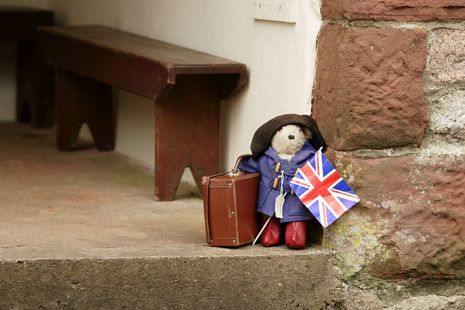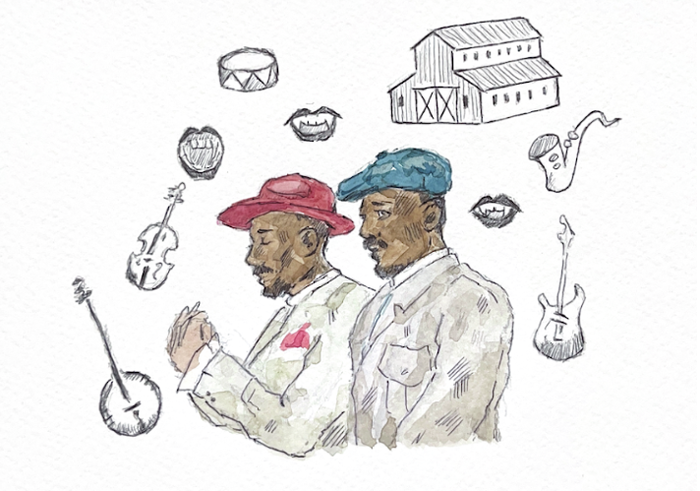The bond between Paddington and the Postcolonial
Sadia Batool discusses how the beloved British emblem explores themes of displacement, immigration, and imperialism

The 2014 Paddington film rendition took two years to attain the title “4th most valuable character brand” by ACF Investment Bank. Based on Michael Bond’s A Bear Called Paddington, the live-action presents us with an adorable, undocumented refugee from climate devastation, who comes to England with unmet demands for the social solidarity promised to his aunt and uncle in a fleeting colonial encounter. The Paddington franchise, which Bond sometimes referred to, tongue-in-cheek, as the “Paddington Empire”, informs us in an easy and endearing way of a few of the struggles a displaced and grieving person might experience, while criticising the nostalgia for imperial Britain that was expressed around the same time in the Brexit referendum. Paddington’s affability has made him a recognisable tool for many migrant justice organisations seeking to galvanise public support. In the last decade of the author’s life, Bond became more public about his own solidarity with migrant justice movements, formally lending Paddington’s image to grassroots campaigns intending to end child detention.
“The “Paddington Empire”, informs us in an easy and endearing way of a few of the struggles a displaced and grieving person might experience, while criticising the nostalgia for imperial Britain”
Paddington is also, however, an idealised, Anglophonic and Anglophilic migrant, who leaves troubled distinctions between deserving and undeserving migrants and accedes to notions of white English cultural superiority. Consider how he hails from “darkest Peru,” a place that draws on the racist trope of ‘darkness’ from Africa to South America that accounted for the extinction of North African Atlas bears in the 19th century. Not once does he question the name his home is given by explorer Montgomery Clyde, nor suggest an alternative. The same can be said of his own name. In A Bear Called Paddington, Paddington goes as far as declining sharing his bear name in fear of it being unpronounceable to his hosts, the Browns. In the film, however, he has Mr Brown make an attempt at it. Even greater comedic value is awarded when Paddington responds “that is extremely rude” before chugging tea straight from a teapot spout. Both Brown and Paddington seem to have been unintentionally rude, but not equally rude. When confronted by Mrs Brown, Paddington acknowledges his name is difficult to pronounce, to which she suggests he be called the toponym, Paddington. His embrace of both an alternative language and name make him appear eager to assimilate and, as such, deserving.
“The valorisation of the “heroic indigene” in colonial discourse and knowledge production has a longer history”
The professional geographer Clyde’s narration of his initial encounter with the bears appears in a short sepia-tone film, recalling a colonial documentary travelogue, made for the “Geographers’ Guild of Great Britain” despite only being a generation removed from the film’s present in 2014 London. He prides himself on coming across “an undiscovered species of bear” and preparing to kill and taxidermy the creature. Only when he has a close call with a deadly scorpion and is saved by Paddington’s uncle does he change his trajectory. To repay this debt and atone for his violent intentions, Clyde teaches the bear and his companion to speak English, names them “Pastuzo” and “Lucy”, gives them a taste of marmalade and a brief history of England. Yet the valorisation of the “heroic indigene” in colonial discourse and knowledge production has a longer history, one which was sometimes recognised and celebrated but also mythologised. This makes Pastuzo a “Noble Savage”, whose kindness represents an admirable but doomed way of life, authorising further colonial incursion. We realise this when we see a flashback of the Geographer’s Guild pushing Clyde to give them the location of the bears from Millicent, the explorer’s daughter, serving as the antagonist’s point of view.
Later, when Millicent seeks to complete the expedition by providing empirical taxidermy evidence, we notice a twist on Spivak’s critique of the imperial preoccupation of white men with saving brown women from brown men: the Browns, a white family, save Paddington, a brown bear, from a malevolent white woman. She is incredulous at their calling him family and cries “You’re not even the same species!” In this trans-species display of solidarity, Paddington is able to hurl a marmalade sandwich at Millicent, mobilising a fleet of hungry pigeons and knocking her over. It is the same commodity, first introduced to his uncle and aunt by Clyde, that defends and empowers him. An intoxicated and aptly named Mrs Bird is the one who further dispatches Millicent.
Truly touching, the film follows Said’s claim that some colonial texts can be read as “both anti-imperialist and imperialist.”
 News / Cambridge academics sign open letter criticising research funding changes22 February 2026
News / Cambridge academics sign open letter criticising research funding changes22 February 2026 News / University Council rescinds University Centre membership20 February 2026
News / University Council rescinds University Centre membership20 February 2026 News / Supporters protest potential vet school closure22 February 2026
News / Supporters protest potential vet school closure22 February 2026 News / Hundreds of Cambridge academics demand vote on fate of vet course20 February 2026
News / Hundreds of Cambridge academics demand vote on fate of vet course20 February 2026 Comment / A tongue-in-cheek petition for gowned exams at Cambridge 21 February 2026
Comment / A tongue-in-cheek petition for gowned exams at Cambridge 21 February 2026








